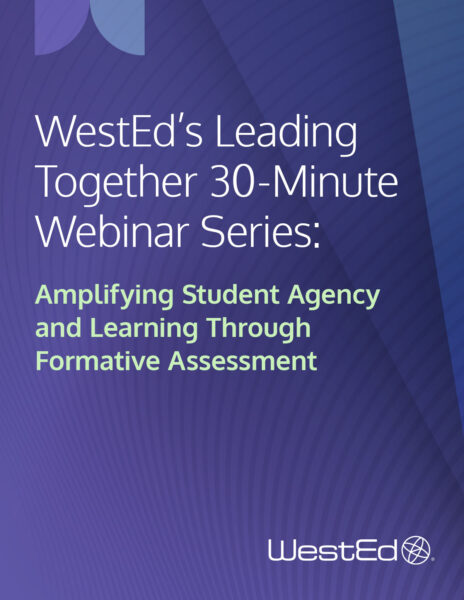
November 7, 2025
WestEd’s recent Leading Together webinar explored how formative assessment practices can transform student learning by developing “agency,” or the skills and mindsets that enable students to actively guide their own educational progress.
Led by Cali Kaminsky, a senior program manager for the Formative Insights team at WestEd, and Yesenia Ayala, a program associate for the same team, the session demonstrated how structured formative assessment routines shift traditional classroom dynamics and give students the tools to steer their own learning.
What Is Formative Assessment?
The WestEd Formative Insights team uses the Cowie and Bell definition: “Formative assessment is defined as a process used by teachers and students to notice, recognize, and respond to student learning in order to enhance that learning, during learning.”
Formative assessment takes place during daily lessons as learning unfolds, with evidence of learning guiding next steps. This ongoing process follows a three-part rhythm: eliciting, interpreting, and using evidence. At its core, formative assessment is reciprocal, a partnership between teachers and students who use evidence together to inform instruction and support one another’s progress. Through this shared responsibility, students learn to take ownership of their learning and build collective efficacy within the classroom community.
How Student and Teacher Roles Shift
Traditional teacher-directed instruction positions the teacher above students, delivering content and assessing work while students receive information, await instruction, and rely on the teacher for feedback and assessment.
By incorporating formative assessments, the relationship transforms into a classroom partnership. Teachers create visible learning opportunities, elicit and use evidence during lessons, support students in learning with and from one another, and share responsibility for assessing the current learning status. Students play an active role in supporting their own learning and their peers’ learning and in assessing academic progress.
Students demonstrate self-efficacy by persisting when tasks are difficult, engage in self-regulation by setting goals, and demonstrate learner autonomy by working comfortably with peers and seeking them out as resources.
The Building Blocks of Learner Agency
During the webinar, Ayala emphasized that agency is not an inherent trait and the skills of agency can and must be taught. Agency develops within a social learning environment where students collaboratively explore ideas and support one another.
The four building blocks of learner agency include metacognition, self-efficacy, learner autonomy, and self-regulation. These elements don’t stand independently; they reinforce one another as agency develops over time. Students gain these skills by linking where they’ve been and where they are with a vision of where they’re going next, understanding why the learning is important to them, and having strategies for moving forward.
What Is the Impact of Formative Assessment on Student Learning?
Research on formative assessment is clear: Supporting students in using evidence of learning strengthens students’ identity as learners, strengthens their motivation to learn, and is a key condition for resolving behavioral issues.
Dylan Wiliam, a well-known researcher in this field, stated, “When teachers do formative assessment effectively, students learn at roughly double the rate than they do without it.”
When formative assessment shifts the student role, it leads to more accessible participation in learning, increased academic discourse, increased student motivation, improved learning behaviors, and an increase in students’ identity as learners.
The Role of Leadership in Supporting Learner Agency
Effective leaders cultivate and model a schoolwide learning culture that mirrors the formative assessment process itself—one grounded in trust, collaboration, and mutual respect. They create environments in which learning is continuous and reciprocal, feedback is valued, and risk-taking is encouraged.
Through ongoing cycles of inquiry and reflection, teachers experience formative assessment as learners, deepening their understanding of how to support students. In turn, educators model these same practices in the classroom, enabling students to take increasing ownership of their own learning journeys.
Watch the full webinar and view other webinars in the Leading Together series.
How We Help
Learn more about WestEd’s work with the Formative Insights team, improving instruction while also developing new practices and cultural norms that help students gain the skills and determination to monitor and advance their own learning toward better outcomes.










